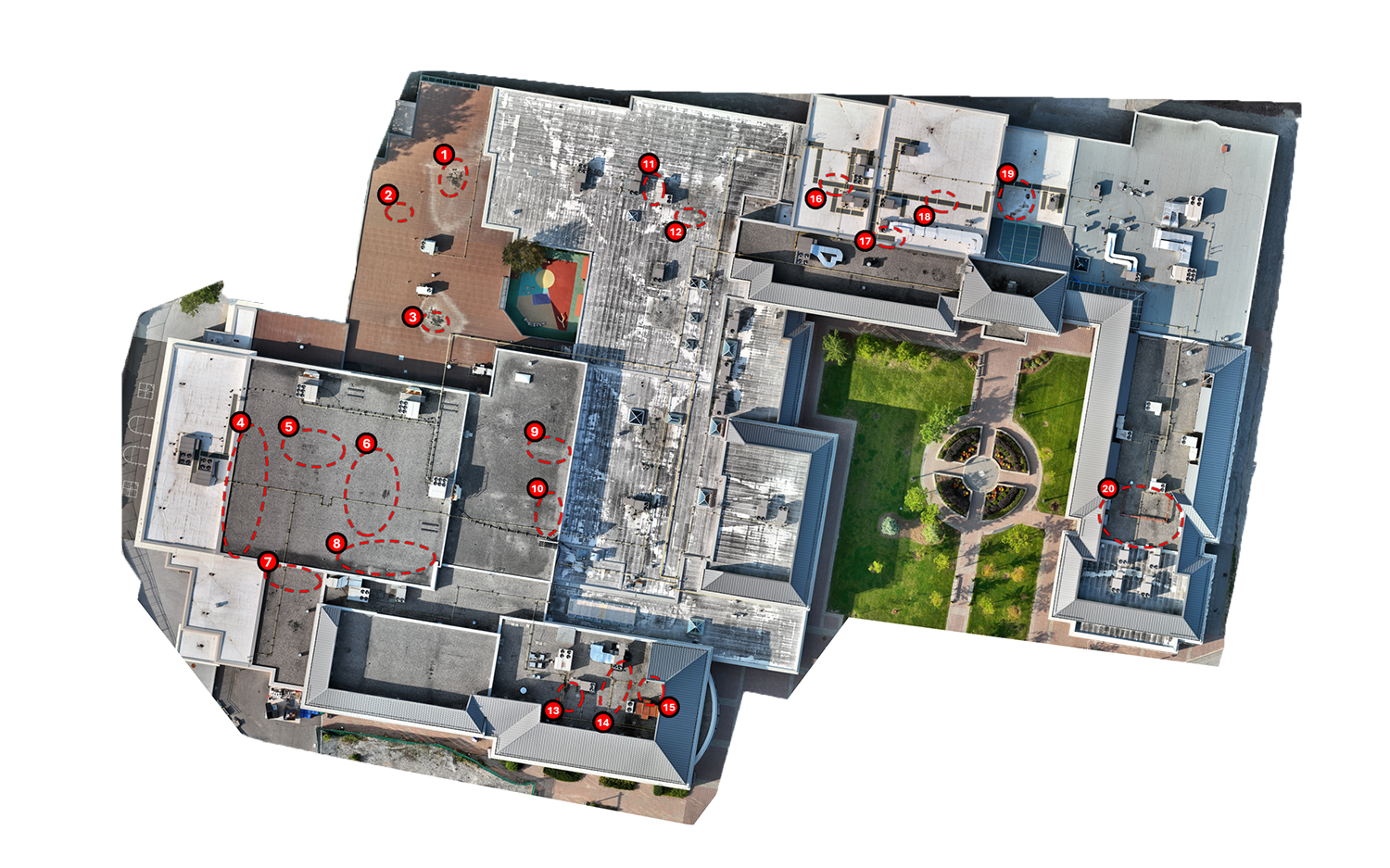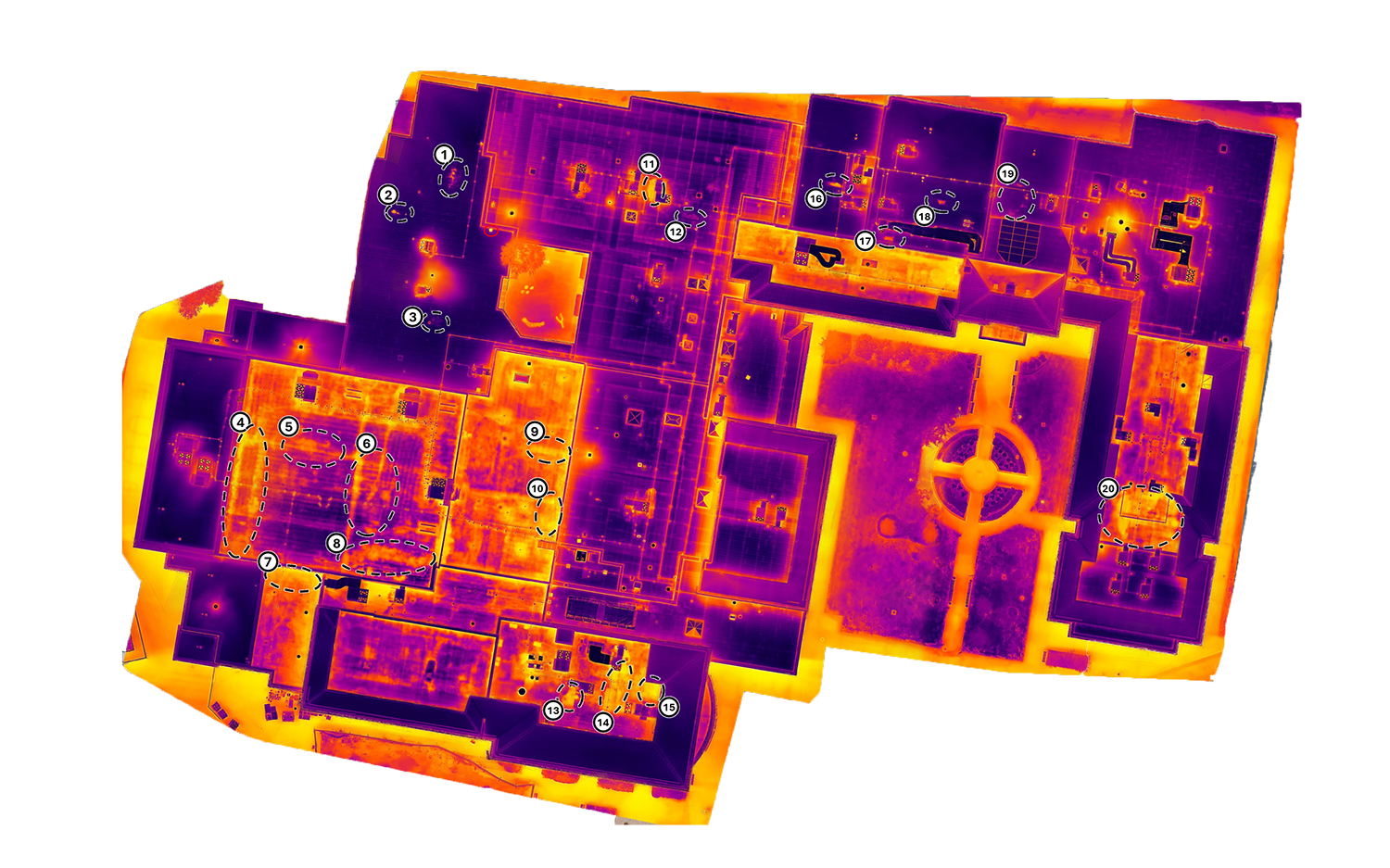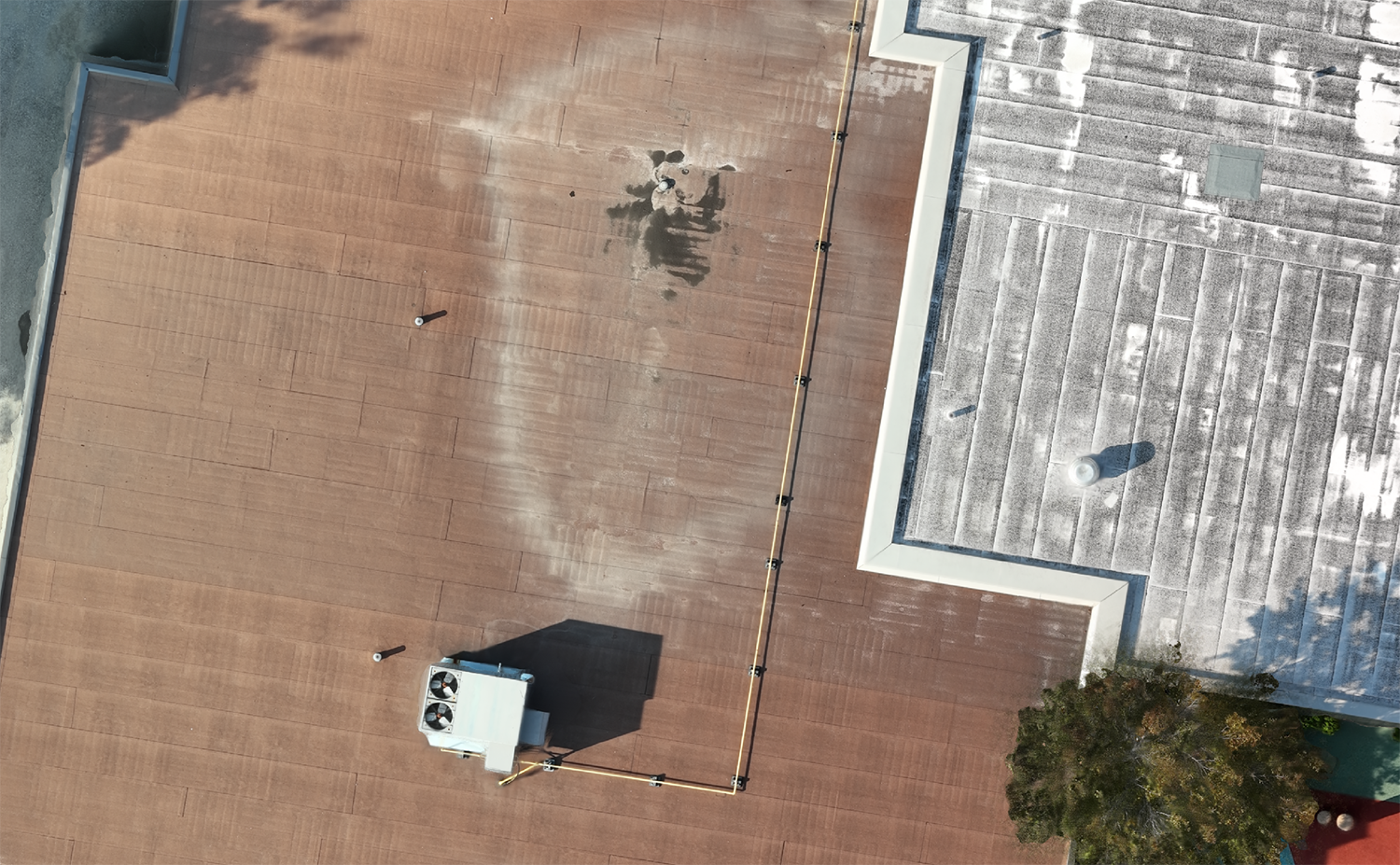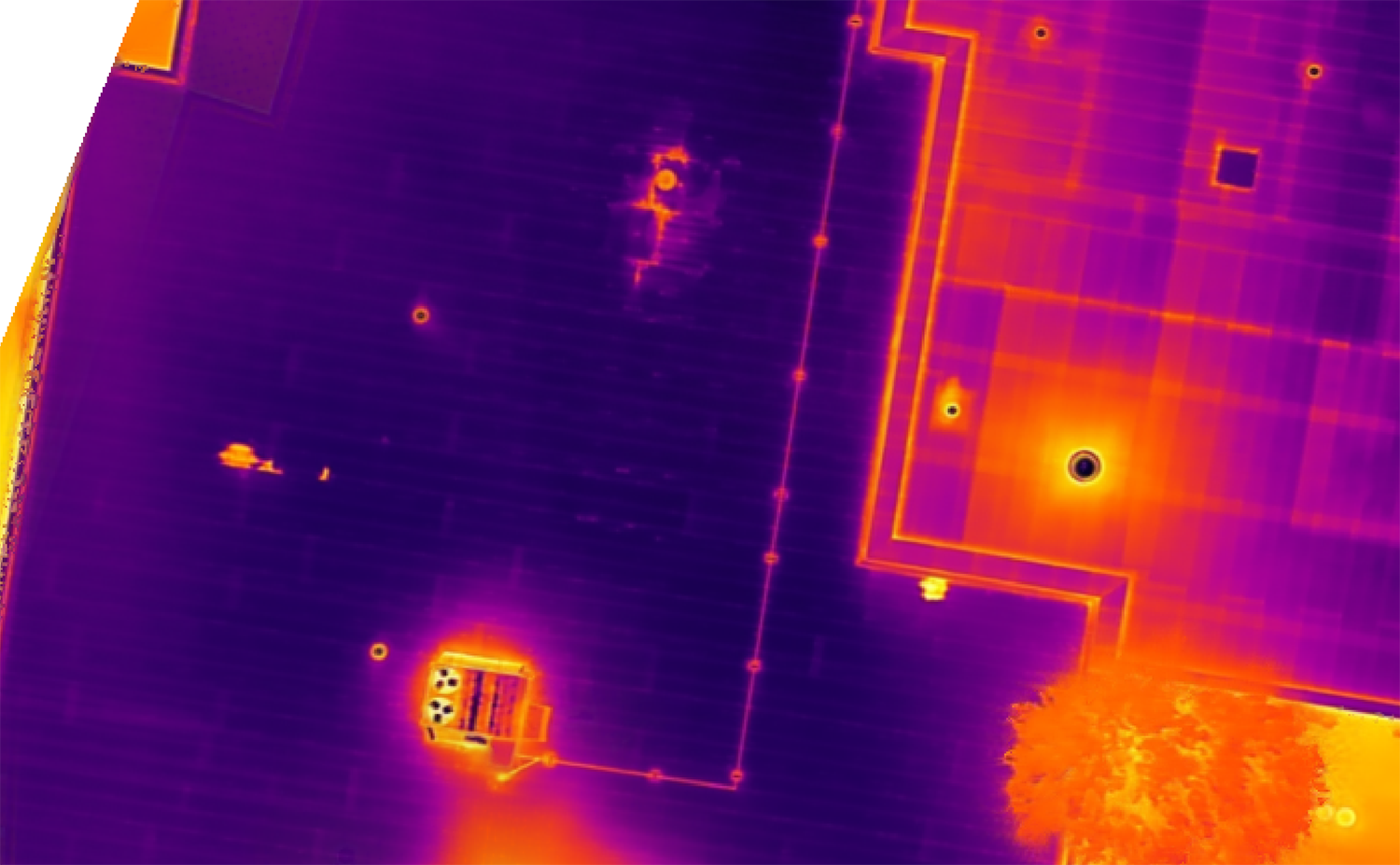
Infrared Drone Roof Inspection
Look Beyond The Surface
What is an Infrared Drone Roof Inspection?
An infrared roof inspection is a non invasive process to inspect a roof by detecting temperature variations on the surface of the roof. We use infrared cameras to find areas of moisture accumulation, insulation deficiencies and other hidden problems. Infrared roof inspections, also known as thermographic roof inspections or thermal roof scans, gives a detailed view of the roof condition, things that are not visible to the naked eye.
By capturing thermal images, these inspections helps to pinpoint issues that if left unaddressed can cause significant damage, to ensure the longevity and integrity of the roof system. It allows for quick and efficient scanning of large areas and helps to find moisture and heat loss issues. Infrared imaging is a valuable tool for building owners and property managers to prevent damage and support maintenance decisions.
Certified Infrared Roof Inspection and Drone Moisture Survey with Thermal Imaging
Our thermal trained and certified team uses drones (sUAS) with both RGB and infrared sensors to do infrared roof inspections and moisture detection on flat roofs. Unlike random roof images, our infrared scanning process maps the entire roof, captures thousands of images and processes them into detailed RGB and infrared maps.
Our process is fast, accurate and safe, non destructive and non invasive. Perfect for property owners, facility managers, roofing contractors and roofing consultants to do roof moisture scans.
Don’t wait until your flat roof leaks start to show. Get ahead of moisture issues by see the unseen with our Aerial Infrared Flat Roof Moisture Scans.
< SLIDE ME >
Comparison Slider - RGB and Infrared Roof Plan
Our Process:
From consultation to final report:
Preparation: Our team does thorough planning and risk assessment before each inspection to ensure safety and efficiency. Weather is a critical factor when planning our thermal roof inspection, so our team monitor the weather leading up to the scheduled infrared roof survey date. We always have a backup date planned, as weather can change and impact the quality of the roof survey.
RGB Roof Survey: During daylight hours, our team will fly the roof with our drone and RGB payload. These images will be used to create the RGB roof map, which will be compared with the infrared roof scan to analyze both visual and thermal roof conditions. This high resolution RGB map will help to find dirt buildup, standing water, debris and other roof conditions, to enhance the inspection.
Thermographic Roof Survey: About an hour after sunset, our team will start the thermal imaging scan using our drone with infrared (IR) payload. This takes longer than the RGB survey as the infrared camera has lower resolution and needs to cover the entire roof like the RGB cameras. This will result to thousands of images depending on the size of the roof.
Data Processing & Analysis: Our team processes the RGB and thermal images into georeferenced maps with centimeter level accuracy, then imports into AutoCAD to measure the area of thermal anomalies. We offer radiometric and non radiometric thermal maps for all flat roof types.
Report Generation: We compile our findings into a report with annotated thermal images and area volumes. We also provide AutoCAD .dwg and .pdf files with title blocks and scaled, georeferenced images of the infrared roof scan.
Why Our Infrared Flat Roof Moisture Survey for Wet Insulation?
Precision: Our pilots capture nadir images of the roof, meaning the camera sensor is pointing straight down, perpendicular to the surface. This is more accurate than ground based walk over or elevated IR captures. Infrared roof inspection is most effective when the IR sensor is perpendicular to the roof to detect moisture by observing the temperature difference between wet and dry roofing materials.
Safer: By using non contact aerial infrared roof surveys we eliminate the need for physical access to the roof, reducing risk. Our certified drone pilots ensure safe operation and follow all RPAS regulations during every infrared roof scan.
Cheaper: Ground based infrared scans require manual labor to access different parts of the roof for thermal scanning. Our drone based infrared roof leak detection eliminates the need for roof access during the thermal scan, reducing labor cost and increasing efficiency.
Faster: We can scan commercial roofs of all sizes in one day or evening. For time critical projects we can deploy multiple teams and drones to finish on time. This is to prevent radiational cooling effects that may affect wet insulation detection. We want to provide thorough and accurate roof moisture scan and deliver results fast.
< SLIDE ME >
Comparison Slider - RGB and Infrared Flat Roof Maps
How Thermal Imaging Cameras Work
Thermal imaging cameras capture infrared radiation, a part of the electromagnetic spectrum that is not visible to humans. They work by detecting the heat radiated by an object, then converts it into a visible image. The camera’s heat readings are not blocked by solid objects like walls or roof membranes, so you can accurately detect temperature differences. Thermal cameras produce black and white images but our thermographers use software to add colors to the images to make the temperature differences more visible. We add colors to the images to easily identify areas of concern on the roof surface like wet insulation or thermal anomalies, making thermal imaging a powerful tool in roof inspections.
Before The Infrared Drone Roof Inspection
Before we conduct an infrared roof inspection the roof surface should be dry and free of debris to get accurate readings. The inspection is usually done in the evening when the roof is cooling down which helps to identify temperature anomalies. We don’t recommend scanning after a recent rain or when the dew point is reached as this can make it hard to distinguish between internal condensation and external moisture. A certified infrared professional will determine the best time to do the scan and ensure the images are interpreted correctly. Proper preparation is key to get reliable thermal scans that reflects the condition of the roof assembly.
Infrared Drone Roof Inspection
During the inspection a thermal camera is used to scan the roof surface, detecting temperature differences and creating a thermal image. The camera can be used from various angles, on the roof, from elevated position or from an aircraft or drone. The thermal image will show areas of concern like moisture accumulation, insulation deficiencies and other hidden problems. The inspection can be done on commercial low slope (flat) roofs but may not be suitable for all roofing materials. By capturing thermal images we can get a clear picture of the roof’s condition and target maintenance and repairs.
Image Analysis
After the thermal images are produced a professional will analyze the images to look for patterns that indicate moisture intrusion, insulation defects and other issues. The analysis will help property owners understand the condition of their roof and identify areas of concern. The thermal images will show warm spots which are areas of moisture accumulation and cool spots which are areas of dry insulation. The images can be used to create a detailed report of the findings and recommendations for repairs or maintenance. This thorough analysis will give property owners a clear understanding of their roof system’s condition and can take proactive action to address the issues.
Who Benefits from Infrared Drone Roof Inspections?
Commercial Property Owners:
Keep your commercial flat roof intact with regular thermal imaging roof inspections. Our thermal roof inspection services help you catch moisture issues before they become costly repairs.
Facility Managers:
Stay ahead of maintenance issues and protect your assets with our infrared roof moisture scans. We give you the data to plan and execute repairs and preserve the value and safety of your facilities.
Roofing Contractors:
Use our infrared roof surveys to assess flat roofs before and after installation or repair projects. Our thermal roof inspections will give you a clear view of the moisture issues so your work is thorough and effective.
Commercial Roof Consultants:
Add our infrared roof scans to your services. Give your clients detailed reports and actionable data for flat roofs so they can make informed decisions and maintain their assets.






